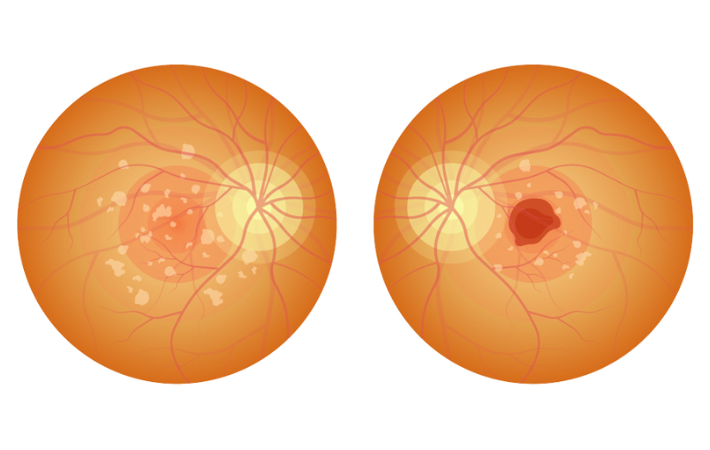BLOG & NEWS


BLOG & NEWS
Understanding Macular Degeneration
Written By: Dr. Diana Nguyen
Updated: December 27, 2023
Understanding Macular Degeneration
Written By: Dr. Diana Nguyen
Updated: December 27, 2023

Macular degeneration, also known as age-related macular degeneration (AMD), is a degenerative eye disease that affects 2.5 million Canadians each year, with females being affected slightly more than males. Unfortunately, it is one of the leading causes of vision loss among older adults.
AMD affects the macula, a small but crucial part of the retina responsible for sharp clear central vision. Central vision is essential for tasks such as reading, driving, and recognizing faces. In this blog, we’ll explore the different types of macular degeneration, its symptoms, and available treatment options all in an effort to increase your understanding the disease.
Different Types of Macular Degeneration

AMD is the generalized term to describe this type of degenerative eye disease. Under the AMD umbrella, there are 2 types of macular degeneration – dry (non-exudative) AMD and wet (exudative) AMD.
Current Treatment
While there is currently no cure for macular degeneration, several treatment options aim to slow the progression and in some cases improve your vision.
Treatments for Dry AMD
1. Electrical microcurrent stimulation therapy such as Macumira©. Macumira© uses microcurrent therapy a non-invasive treatment method that employs low-level electrical currents to stimulate the retina and surrounding tissues improving their function. Macumira© has been shown in a published clinical trial to improve vision after several treatment sessions.
2. Photobiomodulation Therapy: This involves the use of specific wavelengths of light and is a non-invasive treatment to stimulate retinal cellular processes, reduce inflammation, and promote tissue repair which is becoming more commonly known as retina rejuvenation.
3. Low Vision Aids: Devices such as magnifiers, telescopic lenses, and computer screen readers can help individuals with macular degeneration make the most of their remaining vision. Ensure to visit an Optometrist who specializes in low-vision devices so they can help find the optimal solution for you.
4. Vitamins: Specific vitamins such as lutein and zeaxanthin have been shown to slow down the progression of intermediate and advanced AMD.
Treatments for Wet AMD
1. Anti-VEGF Injections: This type of injection is helpful for patients with wet AMD. Intravitreal injections of anti-vascular endothelial growth factor (VEGF) medications can help reduce abnormal blood vessel growth and leakage in the retina, effectively “drying up the retina”
Do you have AMD? Find a MyMacula Doctor to Help!
Macular degeneration is a prevalent eye condition that can significantly impact the quality of life for those affected. Understanding the symptoms, risk factors, and available treatment options is crucial for early detection and management.
If you or someone you know is experiencing changes in vision and want more information on macular degeneration, consult with an eye care professional on our doctor locator. Regular eye exams, a healthy lifestyle, and protective measures can all help to maintain optimal eye health and minimize the risk of macular degeneration.


